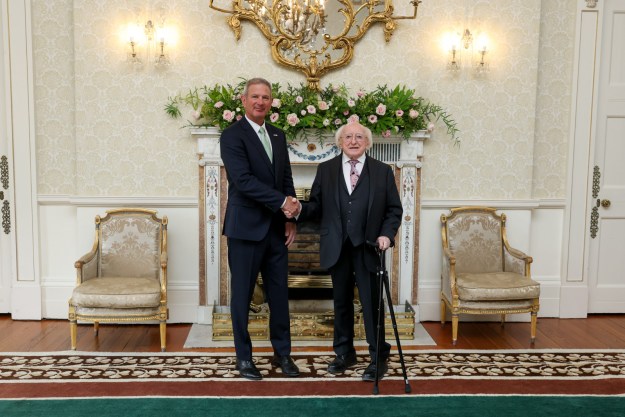While I’m on summer break here’s another of my occasional roundups of external stories about Irish history and contemporary issues. MH
UPDATES:
- Abortions have soared in Ireland since a prohibition on the procedure was repealed in 2018.
- An American diplomat’s anti-Irish slur has not generated too much blowback in Ireland. Most Irish leader appear to be ignoring “the Huckster” as they wait for Trump tariffs on the EU to be resolved. The Ancient Order of Hibernians has demanded an apology. … More interestingly, EPIC, The Irish Emigration Museum has created a unique way to challenge outdated Irish stereotypes: a fake movie trailer that’s intentionally riddled with cliches.
ORIGINAL POST:
- US Ambassador to Israel Mike Huckabee has joined a chorus of pro-Israel Americans who are publicly pressuring Ireland against passing a bill that bans the importation of goods from illegal Israeli settlements in the Palestinian territories. Huckabee has inflamed the controversy with this slur against the Irish on his X feed:
“Did the Irish fall into a vat of Guinness & propose something so stupid that it would be attributed to act of diplomatic intoxication? It will harm Arabs as much as Israelis. Sober up Ireland! Call (the Israeli foreign affairs ministry) & say you’re sorry!”
The Journal.ie provides all the necessary background. This story will be worth following because:
- Ireland is already facing significant economic headwinds as US President Donald Trump threatens to impose 30 percent tariffs on the European Union starting Aug. 1. Passage of the Occupied Territories Bill could make Ireland a target for even higher tariffs. And there’s still more danger: Ireland’s overreliance on US foreign direct investment. Politico.eu offers a compelling analysis of how Trump is testing Ireland’s economic miracle.
- The population of the island of Ireland has topped 7 million for the first time since before the Great Famine of the mid-nineteenth century, according to the Republic of Ireland’s Central Statistics Office and Northern Ireland’s Statistics and Research Agency. Growth in the Republic was more robust and more diverse.
- Proposals for the commercial redevelopment of the General Post Office (GPO), site of the 1916 Easter Rising, is generating debate about the past, present and future of the O’Connell Street corridor. Irish Times historian Diarmaid Ferriter calls for an approach that not only respects history but also “improves the perception of a space widely regarded as deficient and devoid of sufficient imagination for the main thoroughfare of a capital city.”
- A new survey from the Iona Institute for Religion and Society finds more erosion of Catholic identification in Ireland. First Things columnist John Duggan contends that progressives are trying to speed the erasure of Catholicism from Irish history.
- Cross-border, anti-migrant mobilization among ethnonationalist groups in Ireland and Northern Irish Loyalist communities has entered a new, more organized phase. What began as scattered, localized protests in late 2022 have evolved into an increasingly structured and internationally connected movement, according to the Institute for Strategic Dialogue, a global nonprofit that monitors extremism and authoritarianism. … An effigy of a boat containing mannequins of migrants was set alight in the village of Moygashel as part of Northern Ireland’s annual 12 July bonfires.
- The campaign to succeed Michael D Higgins as president of Ireland is beginning to warm. The election date will be set in late autumn, with the inauguration in early November. Higgins, 84, is concluding his second seven-year term. Fine Gael’s Mairead McGuinness and independent TD Catherine Connolly of Galway have declared to date.
This is Ireland’s only national election. The president’s duties include the appointment of the taoiseach, members of the Government, judges and other officials; summoning and dissolving the Dáil, and convening the Oireachtas; and signing legislation into law and/or referring Bills to the Supreme Court. As important, the president serves as the people’s representative and spokesperson, a super ambassador to the world.
I’ll have more on this election later this fall.



